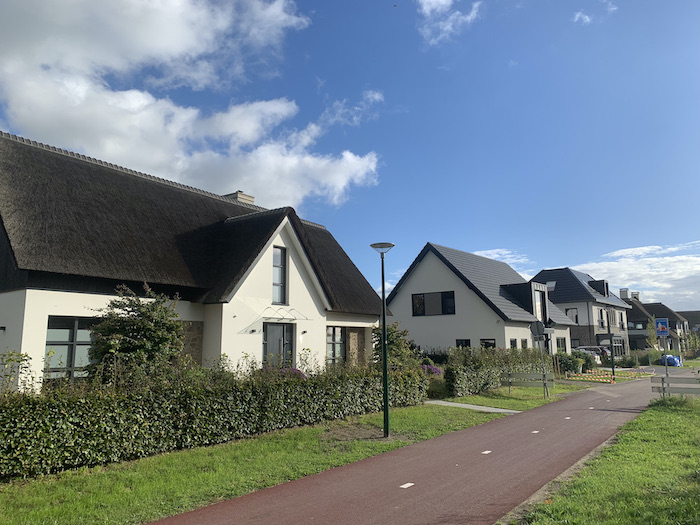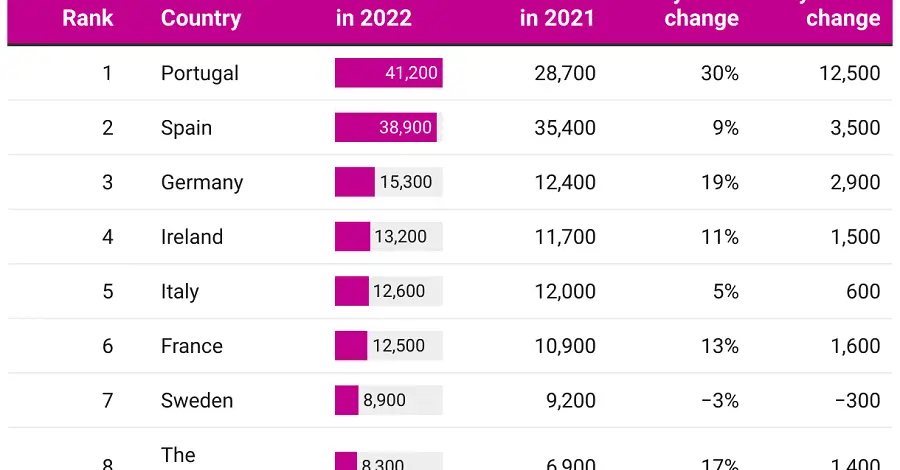When we started Dispatches back in 2016, we imagined our readers would be highly skilled internationals from India, Europe, Africa and East Asia. Yes, there would be a few Americans, but not that many. Just people working at multinational companies on limited assignments. Or the artistes living their Hemingwayesque “A Moveable Feast” fantasy. Or the wealthy, who discovered Monaco and the Côte d’Azure are a lot more glamorous (and safer) than Miami.
Then came Trump.
Then came the pandemic.
Then came January 6.
Then came all the Trump indictments.
Then came the total political dysfunction that has left the United States without a Speaker of the House, the third-most important post behind president and vice-president, since October 4.
Now, publications such as the Economist are documenting how American expats have switched from seekers – people seeking the arts and culture of Europe – to fleers trying to get out while the getting’s good.
From the Economist, August 2023:
More Americans are moving to Europe lately, and many are fleers rather than seekers. The statistics are messy, but in some countries the trend is clear. In 2013-22 the number of Americans in the Netherlands increased from about 15,500 to 24,000; in Portugal it tripled to almost 10,000; and in Spain it rose from about 20,000 to nearly 34,000. In other places, such as France, Germany and the Nordic countries, the number grew moderately or held steady. Britain thinks the number of resident Americans rose from 137,000 in 2013 to 166,000 in 2021 (the latest estimate).
While the post confirms we’re in the right biz at the right time, it was the comment section that really resonated, laying out what motivated them, and what these “fleers” have found.
Great healthcare and public transport are things we should invest in! You notice their value when you don’t have them.
I’m one of those expats. Moved in 2014. Best decision I ever made.
In addition to the big ones … healthcare, transportation, and safety … affordable education, food and utilities, cleaner food and energy as well.
Moved to Germany in 2006. Best decision we ever made. Much more family friendly here with the things that matter most. (Healthcare, Education, Vacation, Parental leave, etc.)
I’m so grateful I left Babylon US. The best decision I ever made!!!
“Best decision I ever made?” Maybe … but from our own experiences, many have no idea what they’re in for.
We’ve been writing about Americans leaving, or at least thinking about leaving, for years. But that was just us. Now, Big Media are crunching data and they’ve come to the same conclusion we reached back in 2020. As the pace of Americans expatriating increases, we ask, “What are you getting into?”
The single biggest reason – aside from business – we have for living here is personal safety. Which really came home to my wife and co-CEO Cheryl on a recent business trip to San Francisco. Because we’re so used to low crime, Cheryl heads out the door for an early morning walk. It wasn’t until she got two blocks from her hotel did she realize that walking at 4:30 in the morning in San Francisco might not be the smartest thing to do.
Becoming an expat can be the best or worst experience of your life.
This is the stuff the blogs and Facebook expat communities try to address, but usually have bad info.
Here’s our personal advice drawn from 15 years as expats

Don’t even think about moving to Europe without arranging housing first
You are not the only one coming to Europe. EVERYONE is coming to Europe from the four corners of the globe to take advantage of high-functioning societies, which is an expensive proposition. Even if you have a lot of money, finding a rental or buying a house in a city is going to take time. And prices are insane in major expat centers such as Paris, Amsterdam, Stockholm and Copenhagen, as well as in tech centers such as Eindhoven.
Even in second-tier cities such as Maastricht, we’re seeing more small apartments (1,000 square feet or less) going for 500,000 euros. Remember, in Europe – as opposed to the U.S. – everyone wants to live in the urban centers.
I arrived in the Netherlands as a DIY expat (not as an executive transfer) months in advance of my family with visions of renting a penthouse in the city center. It took me months to find a farmhouse in a tiny village. And that was at a time when there was still a reasonable amount of inventory. Now, there’s none, and that goes for whether you’re an impoverished student or an affluent executive.
In the U.S., it’s still possible to find affordable housing in suburbs relatively close to cities. Here, that’s not the case, whether you’re talking about Lisbon, Berlin or where we live in Eindhoven. Here’s Marnya Klyvko’s series about buying a house in Berlin.
Final points: It is possible to find new homes (see photo above) that are McMansion-like in their suburban esthetic outside large cities. But get ready to pay. The only affordable housing in Europe is in rural areas where everyone has left for career opportunities in cities. If that sounds good, check out our long, long list of villages with 1 euro houses here.

Education
If you’re taking your kids, know that education is totally different at every level. The good thing is, for expats, it’s far less expensive than private school in the U.S. Our daughter Lale went to both high school here and university, earning her bachelor’s and master’s degrees at the University of Maastricht. Had she attended similar schools in the United States, it would have cost us hundreds of thousands of dollars. Here, her terrific international school was about 9,000 per year versus 50,000 per year for a private school in our former American neighborhood, and her Dutch university about 21,000 per year, which included tuition and living expenses.
But the experience is totally different from the lack of college sports to the expectations of teachers and professors to the freedom students have here to fail.
Here’s a post from a few years back about Lale’s early experience after she arrived in 2016.
Making friends is work
Making friends should be organic, but it doesn’t always work out that way. When we moved to Izmir, Turkey for my job as a military reporter back in 1999, we knew no one in this giant city of 4 million people. We had a couple of phone numbers from my new boss. So, as soon as we arrived and checked into the hotel, I called a number for “Tim” only knowing he was American with a son about the same age as our daughter Lucy. That day we were hanging out with Tim, his wife Rita and his son Stephen, and after some crazy, crazy adventures, we are close friends to this day.
You really need friends because you can’t figure it all out by yourself.
If you need a good auto mechanic, you ask your neighbors. Same for everything from home repairs to vacation suggestions to restaurants.
I’m an extravert. I can walk up to people and strike up a conversation without even thinking about it. Not everyone is. If you’re really introverted, or like routine patterns and predictability, I’m not sure the expat life is for you. If you’re really comfortable with American food and culture, I’m not sure the expat life is for you.
If you don’t make friends easily, I’m sure the expat life isn’t for you.
Day-to-day life
Personal space isn’t a thing in Europe as a whole, especially in the Netherlands and the Nordics. They’re not being rude. Europeans just don’t have the same situational awareness. Cheryl says the Netherlands is a whole country full of Mr. Magoos, the 1960s cartoon character who couldn’t see anything, yet managed to avoid catastrophe just by dumb luck. For example, Dutch bikers often pull out into traffic without even looking. Why? They know everyone is looking out for each other.
Rules
In most countries in Europe, there are a lot of rules regulating everything from recycling to housing. If you want to live the rugged individualist, go-it-alone, libertarian lifestyle, this is not the place to do it. These are collectivist societies where the goal is providing the best possible lives for the majority of people. Blatant individualism here is frowned upon.
No go, Ari Gold
You can never, ever go full Ari Gold on people. You just can’t. Trust me … I’ve spent my life trying to control my temper. In the U.S., it didn’t matter. Here, it matters for a lot of reasons, including avoiding ending up in jail and losing your long-term visa. If you think someone’s staring at you, they probably are. But so what? If someone cuts in line, let it go, man.
Zen, dude, zen.
When you do go full Ari, you lose people’s respect.
What’s up, Doc?
Moving to the Netherlands, for example, you must choose a family doc who lives within 15 minutes of your house. Why? Because they make house calls and need to be able to get to you quickly. We can look out our window and see one doctor’s house and we are about 200 paces from our personal doctor’s house. That narrows the field. But the same office can have a competent, friendly doctor and a doctor you really don’t want to deal with. We’ve experienced that ourselves.
Overall, our experiences within the Dutch healthcare, with its universal insurance, has been terrific. Since Cheryl was diagnosed with diabetes earlier this year, the doctors have come through for her, and her meds, glucose sensor and all supplies are covered under the government regulated deductible of 385 euros per year.
That’s right.
Meet the deductible, and just about everything else is covered under your individual plan.
Find a good veterinarian
On the whole, animals are treated well here and laws about adopting from kennels are strict. All the vets we’ve used have been brilliant, and our vet even came to our house to put down our elderly, ill dog Skeeter on one of the saddest days of my life.
Find a good salon.
We have Suus, but she’s so busy, it’s difficult to get an appointment. So, don’t wait till you need a stylist to start looking.
Find a good bank
When I was a kid, I needed to get some money in the days before ATMs, so I went to a French bank only to find it had an impregnable fortress with armed guards at the door. I had to explain to the guards what I wanted. Banking here is not like in the U.S. You rarely go to a physical bank, and there are no such things as bank branches. But, to start the process of getting a long-term visa in the Netherlands, you have to open a bank account at a Dutch bank. Several conventional banks, such as ABN Amro, are pretty expat-friendly. There are also a million fintech companies offering virtual banking services such as N26 and Revolut.
Also, compared to the U.S., most of Europe uses chip cards/debit cards. In some places, it’s impossible to use cash and European groceries typically DO NOT take American credit cards.
Driving
You’ve hit the jackpot in sooo many ways if you have been recruited by an employer and are eligible for the 30-percent ruling. Not only is 30 percent of your income not taxed for the first five years, you can simply exchange your driver’s license for a Dutch one. If you can’t exchange your license, you must take driving lessons and pass a theory exam and driving exam. Even though she’s driven since she was 16, Cheryl spent about 2,000 euros on the required lessons. If she had passed the exam on the first try, it would’ve cost only about 800 euros.
She finally got her license on the third try and many hundreds more … not to mention gnawing her arm off in frustration.
Owning a car is also expensive, with crazy gas prices and highway taxes. And let’s say you have a car in Paris or Amsterdam … parking is going to be a nightmare.
Sadly, public transport is not getting better. For example, the Netherlands and Germany both are negligent in funding their trains, and not every city has multimodal transport – trains, trams and buses. The biggest frustration is bus transportation because you can’t count 100 percent on the bus arriving on time … or at all. Now, France is the exception to this, spending billions to upgrade its transport, and in Luxembourg, all public transportation is free!
Grocery shopping
Get ready to change your shopping habits. Europe and its component countries are NOT 24-hour societies. Our local supermarkets close at 8 p.m. on weekdays, 6 p.m. on Sundays. Also, in most countries, no one bags your groceries for you and it’s a race to get your stuff packed up before the person behind you.
Europeans tend to shop every day, not a big weekly shop.
Finally, most supermarket chains don’t always have the same goods on a regular basis, and German discount chains such as Aldi and Lidl have perpetually changing food inventories as well as weird hardware offerings such as espresso makers and belt sanders.
No, really.
So, that’s a start, Americans. There’s so much more to learn. But here’s what I can tell you for sure … you never stop learning all the quirks, puzzles and pleasures of expat life. And you can always come here to find information you need, the “expat essentials” aggregated from expats living all over Europe.
–––––––––
See more about expat life here in Dispatches’ archives.
Co-CEO of Dispatches Europe. A former military reporter, I'm a serial expat who has lived in France, Turkey, Germany and the Netherlands.















